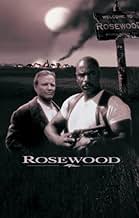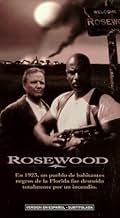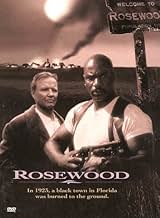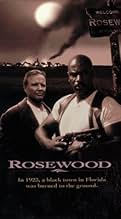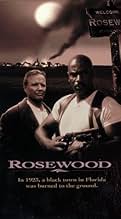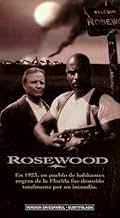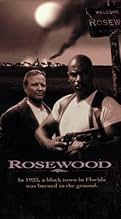IMDb RATING
7.2/10
9.2K
YOUR RATING
A dramatization of a 1923 horrific racist lynch mob attack on an African-American community.A dramatization of a 1923 horrific racist lynch mob attack on an African-American community.A dramatization of a 1923 horrific racist lynch mob attack on an African-American community.
- Awards
- 3 wins & 10 nominations total
- Director
- Writer
- All cast & crew
- Production, box office & more at IMDbPro
Featured reviews
John Singleton's Rosewood documents the tragedy of the Rosewood Massacre in piercingly raw detail, showing us how a prosperous Florida town fell to shambles from one woman's lie, spawning over a hundred murders and massive calamity on the survivor's shoulders for years to come. This event occurred in 1923, but is usually left unprinted in history textbooks and shoved to the side as if it had never occurred. Just a few weeks ago, a gunman opened fire on patrons in a movie theater, killing twelve and wounding fifty eight. That story was the most talked about thing for the entire week and still sneaks its way into the top story.
Rosewood isn't written with anger, hostility, or a burdening grudge. It is written with its mind firmly centered on history and examination rather than shameful exploitation. The town of Rosewood was populated mainly by blacks who are also operating most of it, with the notable exception of the white grocery store owner, Mr. Wright (Jon Voight). About 1/3 of the town is white, and most have a great disdain for the blacks, which as we know by now wasn't atypical.
The film centers mainly on Mann (Ving Rhames), a World War I veteran who travels aimlessly on a horse in search of land that he is willing to pay good money for. When he shows up at a town auction and becomes one of the highest bidders, he does nothing but generate sneers and racist remarks from the patrons. Mann is, for the most part, impassive towards the criticism. One of his friends that he grows closer to over time is Don Cheadle's Sylvester, who happens to be one of the strongest character actors of this or any other decade.
The hostility towards blacks skyrockets when the mentally unstable woman, Fanny Taylor (Catherine Kellner) is triggered into a screaming frenzy repeatedly saying a black man beat her, but did not rape her. The reality is, Fanny is a victim to the abuse of her lover, who consistently throws her around and leaves her bruised and battered. Regardless, there is simply no justification for this kind of impulsiveness.
And thus, the bell begins to ring louder and for longer and the towers slowly begin to fall; the town becomes even more racially divided than before, violence breaks out in the streets, houses are burned, neighbors become enemies, and secrets holding important, valuable information are kept until it's too late. A white sheriff (Michael Rooker) has an understanding of the events that occurred with Fanny Taylor, begins to piece together that the story of the evil black man beating the white woman is a myth, but is unfortunately silent about the event until violence overwhelms the once humble town. Even Mann grows aware of the impending violence and unsafe nature of this town, and fears because of his "new" status that he will fall victim to murder.
The film touches on some other topics not usually explored in a period piece, such as how the idea of racism is spread through explicit teachings from father to son. One father teaches his son how to make a noose, and continuously reminds him that the blacks are the enemies in which the whites must take action against. This even involves the father taking the son along on trips where they go hunting, and I don't mean for animals.
Writer Gregory Poirier illustrates this story on a large, limitless canvas for John Singleton to direct with a looming challenge. There is an unusually broad amount of talent here and a plethora of characters and situations to document, and Poirier is careful never to spend too much time on one specific situation, but takes the time to balance the events out evenly. It wasn't long before this that Singleton constructed Boyz N The Hood, a film detailing the tribulations of growing up on the wrong side of the street. That appears on my list of most captivating dramas for its poignant dialog and incredible performances. Rosewood is in an entirely different league; a film that features many different scenes, all highly detailed and illustrated intricately, that is strung together by an easily understandable story.
Speaking in terms of aesthetics, the costume and set design here is lavish and meticulous. From the sets of the stores, to the simplicity of the roads, the people, the clothing, and the shops, everything is portrayed in such a refreshingly different light that it becomes indescribably powerful. The care and attention here is not only commendable, but award worthy.
Yet sadly, Rosewood, like the actual event, is a long forgotten wave in the ocean of cinema and the world. The film's hefty budget, for which I assumed was mainly used on costumes, set structures, and actors, proved unable to be recouped and went on to become a commercial failure, only seen by those brave enough to endure its tragedy with an open mind and a hungering for knowledge. This is not a movie that many will be able to digest easy. It's a long and brutal picture. But one that is masterfully done in almost every respect and one that should brew a healthy, informative conversation soon afterwards.
Starring: Jon Voight, Ving Rhames, Don Cheadle, Bruce McGill, Loren Dean, Esther Rolle, Elise Neal, and Michael Rooker. Directed by: John Singleton.
Rosewood isn't written with anger, hostility, or a burdening grudge. It is written with its mind firmly centered on history and examination rather than shameful exploitation. The town of Rosewood was populated mainly by blacks who are also operating most of it, with the notable exception of the white grocery store owner, Mr. Wright (Jon Voight). About 1/3 of the town is white, and most have a great disdain for the blacks, which as we know by now wasn't atypical.
The film centers mainly on Mann (Ving Rhames), a World War I veteran who travels aimlessly on a horse in search of land that he is willing to pay good money for. When he shows up at a town auction and becomes one of the highest bidders, he does nothing but generate sneers and racist remarks from the patrons. Mann is, for the most part, impassive towards the criticism. One of his friends that he grows closer to over time is Don Cheadle's Sylvester, who happens to be one of the strongest character actors of this or any other decade.
The hostility towards blacks skyrockets when the mentally unstable woman, Fanny Taylor (Catherine Kellner) is triggered into a screaming frenzy repeatedly saying a black man beat her, but did not rape her. The reality is, Fanny is a victim to the abuse of her lover, who consistently throws her around and leaves her bruised and battered. Regardless, there is simply no justification for this kind of impulsiveness.
And thus, the bell begins to ring louder and for longer and the towers slowly begin to fall; the town becomes even more racially divided than before, violence breaks out in the streets, houses are burned, neighbors become enemies, and secrets holding important, valuable information are kept until it's too late. A white sheriff (Michael Rooker) has an understanding of the events that occurred with Fanny Taylor, begins to piece together that the story of the evil black man beating the white woman is a myth, but is unfortunately silent about the event until violence overwhelms the once humble town. Even Mann grows aware of the impending violence and unsafe nature of this town, and fears because of his "new" status that he will fall victim to murder.
The film touches on some other topics not usually explored in a period piece, such as how the idea of racism is spread through explicit teachings from father to son. One father teaches his son how to make a noose, and continuously reminds him that the blacks are the enemies in which the whites must take action against. This even involves the father taking the son along on trips where they go hunting, and I don't mean for animals.
Writer Gregory Poirier illustrates this story on a large, limitless canvas for John Singleton to direct with a looming challenge. There is an unusually broad amount of talent here and a plethora of characters and situations to document, and Poirier is careful never to spend too much time on one specific situation, but takes the time to balance the events out evenly. It wasn't long before this that Singleton constructed Boyz N The Hood, a film detailing the tribulations of growing up on the wrong side of the street. That appears on my list of most captivating dramas for its poignant dialog and incredible performances. Rosewood is in an entirely different league; a film that features many different scenes, all highly detailed and illustrated intricately, that is strung together by an easily understandable story.
Speaking in terms of aesthetics, the costume and set design here is lavish and meticulous. From the sets of the stores, to the simplicity of the roads, the people, the clothing, and the shops, everything is portrayed in such a refreshingly different light that it becomes indescribably powerful. The care and attention here is not only commendable, but award worthy.
Yet sadly, Rosewood, like the actual event, is a long forgotten wave in the ocean of cinema and the world. The film's hefty budget, for which I assumed was mainly used on costumes, set structures, and actors, proved unable to be recouped and went on to become a commercial failure, only seen by those brave enough to endure its tragedy with an open mind and a hungering for knowledge. This is not a movie that many will be able to digest easy. It's a long and brutal picture. But one that is masterfully done in almost every respect and one that should brew a healthy, informative conversation soon afterwards.
Starring: Jon Voight, Ving Rhames, Don Cheadle, Bruce McGill, Loren Dean, Esther Rolle, Elise Neal, and Michael Rooker. Directed by: John Singleton.
Less than 100 miles away from me is a town that is a reminder of the hatred that exists in those who grew up in the rural South. I just read Olympia Vernon's book on a similar subject, so it is fresh in my mind. The inhumanity of man towards our fellow man is incomprehensible to me. Whether it is Schindler's List or Rosewood, it is hard to understand. We only have each other, and to think than any one of us is better than the other is pure crap.
This film hits hard. It will move you to tears and anger you at how some people close by are seething with hatred. I would even go so far as to say that if it doesn't viscerally affect you, then you are either dead or part of the problem.
The film itself features outstanding performances by Ving Rhames, Jon Voight, Don Cheadle, Esther Rolle and many others. Their work will hopefully inform the viewer of this great tragedy and remind them that it is not something in the past. Florida's election fiasco of 2000 and the aftermath of Hurricane Katrina serve as evidence that the State and federal government is full of racists who continue these acts today.
This film hits hard. It will move you to tears and anger you at how some people close by are seething with hatred. I would even go so far as to say that if it doesn't viscerally affect you, then you are either dead or part of the problem.
The film itself features outstanding performances by Ving Rhames, Jon Voight, Don Cheadle, Esther Rolle and many others. Their work will hopefully inform the viewer of this great tragedy and remind them that it is not something in the past. Florida's election fiasco of 2000 and the aftermath of Hurricane Katrina serve as evidence that the State and federal government is full of racists who continue these acts today.
This movie is a very violent and sad movie--guaranteed to have an impact on all its viewers. Because of the serious and violent nature of the film, I would not suggest this for viewing by younger kids, though for teens it probably will be okay--provided you watch it with them and explain the context for the film.
The exact events that happened in this small town many decades ago are very vague. We know, historically, that MANY people (mostly Black-Americans) were killed by marauding gangs of whites. However, exactly WHAT sparked it and the exact events are muddled by time and the fact that there were very few living witnesses to the carnage. As a result, the ONLY reasonable way the film could be made was to create a fictionalized drama around the framework of the known events. And, as such, it is an immensely touching and effective film.
The exact events that happened in this small town many decades ago are very vague. We know, historically, that MANY people (mostly Black-Americans) were killed by marauding gangs of whites. However, exactly WHAT sparked it and the exact events are muddled by time and the fact that there were very few living witnesses to the carnage. As a result, the ONLY reasonable way the film could be made was to create a fictionalized drama around the framework of the known events. And, as such, it is an immensely touching and effective film.
Director John Singleton who's first film (Boyz 'N the Hood)left audiences in awe has once again cast an emotional spell upon his audiences. Some people have a question of how historically accurate the film itself is. With some browsing around from site to site I found that the place and time period hold true, along with with the weaponry (I was skeptical about the dual pistol action)used in the film to be weapons of the time period. Also while browsing I came across a quote from the director himself "I am concerned about absolute historical accuracy to an extent, but I am really more worried about being truthful to the essence of what happened at Rosewood... I am making a movie that people will respond to." With that in mind the general plot seemed to take course as accurately as possible, (considering the account of this event has several different death counts depending on the source)all characters used the same names as the real life people, well besides Ving Rhames' character Mann who is entirely fictional built-in to make the movie more interesting. Other than that shady character John Singleton kept to the truth and provoked a variety of emotions from his audience once again, fulfilling his goal.In the end it was a very powerful film on a tragic event.
I saw this movie in my African American Experience class in 12th grade. It was incredibly saddening to know that such hatred exists within this country. The fact that it's a true story makes it worse. Bout time movies like this are being made despite the discomfort to others. Black history should not be denied because whites or anyone else feels uncomfortable or guilty at the end of a film. No one should be robbed of their history because it makes you "feel bad". The fear and isolation are undoubtedly felt through the black characters. To live in absolute fear for your life because of your skin color is perceptible even today. This story forces people to reconcile with the past to avoid further instances in the future. Not to make people feel guilty. Besides, minorities have felt bad in movies for a long time and nobody gave a damn as long as you know who looks good. I'm not militant or whatever else comes to mind. This movie is excellent because it shows a true story in historical fashion. Everyone did an excellent job. I felt anger and I'm sure that wasn't by accident. Jon V. was really convincing. I'm a big fan of his and he really made me dislike him. Just the very events of having a system of hatred set up against someone so that they don't get a chance is played out well in this film. Please do watch and get a little perspective.
Did you know
- TriviaAfter Wynton Marsalis' score was rejected, he released his score as an album called "Reeltime".
- GoofsIn the title sequence, the date is Thursday, December 31, 1922; in reality, that date was a Sunday.
- SoundtracksSylvester's Blues
Written by Wynton Marsalis
Produced by Delfeayo Marsalis
Performed by Eric Reed
Courtesy of Impulse Records
- How long is Rosewood?Powered by Alexa
Details
Box office
- Budget
- $25,000,000 (estimated)
- Gross US & Canada
- $13,130,349
- Opening weekend US & Canada
- $3,154,075
- Feb 23, 1997
- Gross worldwide
- $13,130,349
- Runtime
- 2h 20m(140 min)
- Color
- Sound mix
- Aspect ratio
- 2.39 : 1
Contribute to this page
Suggest an edit or add missing content


